 Organic Perfume: The Complete Beginners Guide & 50 Best Recipes For Making Heavenly, Non-Toxic Organic DIY Perfumes From Your Home! Table of ContentsIntroduction Inside this book you will find information on how make your own organic and natural perfume, blend oils and create amazing scents to suit your individual personality. You will also discover the secrets about the hidden chemicals in commercial perfumes that the manufacturers dont want you to know, you will learn how to use products you can find in your local supermarket as a base for your creations and find recipes which will enable you to wonderful gifts for friends and family. The only thing standing in the way of you creating beautiful scents that have added therapeutic benefits is the limit of your own imagination. Thanks again for downloading this book, I hope you enjoy it! Chapter 1 What is Organic Perfume Organic perfumes are made up from natural products and contain none of the additional chemicals and synthetic scents that commercial perfumes are made from. They are manufactured using pure essential oils which not only offer an amazing variety of scents but which also contain therapeutic benefits, so in addition to smelling great, your perfumes could also be treating any ailments or long term health conditions you may have. In contrast, many commercial perfumes can cause health problems and/or exacerbate some conditions you may already be suffering from, such as allergic reactions, headaches, hormone disruption, increased severity of asthma or eczema conditions, thyroid complications and a suppressed immune system.
Organic Perfume: The Complete Beginners Guide & 50 Best Recipes For Making Heavenly, Non-Toxic Organic DIY Perfumes From Your Home! Table of ContentsIntroduction Inside this book you will find information on how make your own organic and natural perfume, blend oils and create amazing scents to suit your individual personality. You will also discover the secrets about the hidden chemicals in commercial perfumes that the manufacturers dont want you to know, you will learn how to use products you can find in your local supermarket as a base for your creations and find recipes which will enable you to wonderful gifts for friends and family. The only thing standing in the way of you creating beautiful scents that have added therapeutic benefits is the limit of your own imagination. Thanks again for downloading this book, I hope you enjoy it! Chapter 1 What is Organic Perfume Organic perfumes are made up from natural products and contain none of the additional chemicals and synthetic scents that commercial perfumes are made from. They are manufactured using pure essential oils which not only offer an amazing variety of scents but which also contain therapeutic benefits, so in addition to smelling great, your perfumes could also be treating any ailments or long term health conditions you may have. In contrast, many commercial perfumes can cause health problems and/or exacerbate some conditions you may already be suffering from, such as allergic reactions, headaches, hormone disruption, increased severity of asthma or eczema conditions, thyroid complications and a suppressed immune system.
These health risks are caused by the chemicals which are included in the perfume recipes and which, because of the secrecy clauses included in the manufacture of commercially branded perfumes, are often undisclosed on the product packaging. Many of the chemicals included are petro chemicals and are derived from either petroleum or natural gases, and it is around half of these chemicals which are not required to be disclosed. More worrying is that over 300 of these chemicals can be used in perfume manufacture and around 43% of these are untested and have no FDA approval. The scent of commercial perfumes does tend to last longer than an organic perfume but again, this is due to added fixative chemicals such as Diethyl Phthalates. The possible health costs of regular use of these chemicals in the perfume you wear is extremely high and can include an increased risk of developing cancer, possible birth defects and low sperm count. An Environment Defence Group conducted a study on the presence of chemicals in 3 new born babies.
The findings showed the presence of 137 chemicals. Not all of the chemicals found in the newborns are used in perfumes, however a number of them are. Of the 137 chemicals found: 132 are linked with the onset of cancer 133 are linked to reproduction and development problems 110 are toxic to the brain and nervous system For the average person who uses commercial perfumes once or twice a week, this should cause no real problems but for those who regularly use it at least once a day it I worth remembering that around 60% of the perfume you wear will be absorbed into the bloodstream. As much of the perfume is made up from chemicals, and contains very little natural scent, this is a lot of unnatural products you are absorbing and carrying around in your body. The health risks attributed to some of these chemicals include: Parabens A synthetic preservative which is reputed to disrupt hormones. Phthalates A preservative which is carcinogenic, (linked with cancer).
Additional contraindications of phthalates include kidney and liver damage, birth defects, decrease in sperm count and premature breast development in both male and female. Synthetic Musks linked to a disruption in hormones. Traces of synthetic musks have been found in umbilical cord blood from newborn babies, breast milk, body-fat and fat tissue. While some pure essential oils are not completely risk free, those that do carry restrictions, such as those not suitable during pregnancy, are not hidden and the information can be freely found. This allows your perfumes to be tailored to suit the person who will be wearing it. Chapter 2 How is Organic PerfumeMade? Before you begin to make your perfume you must decide what strength you want to make, what type of perfume you would like and what sort of scent you require. Chapter 2 How is Organic PerfumeMade? Before you begin to make your perfume you must decide what strength you want to make, what type of perfume you would like and what sort of scent you require.
There are five different perfume strengths for feminine perfumes and three main strengths for masculine scents. Parfum (Perfume) and Cologne Perfume and cologne are the strongest scented of the perfume types. They contain between 15 40% of essential oils to 60 85% of dilution substance. As such, these are also the most expensive to purchase, but this cost is dramatically reduced when making it yourself at home. Espirit de Parfum/Cologne This is the least common strength of commercial perfumes but works well for home manufacture. Eau de Parfum This strength tends to be the most popular blend as it carries much of the intensity of a full perfume but is light enough for day wear and strong enough night wear. Eau de Parfum This strength tends to be the most popular blend as it carries much of the intensity of a full perfume but is light enough for day wear and strong enough night wear.
It uses between 10 20% essential oils. Eau de Toilette Using just 5 15% essential oil, this is a much lighter variety than Eau de Parfum and works well as a daytime scent. Eau de Cologne This is a light masculine scent which is generally used for daytime or work in place of the heavier scent of full Cologne. It is made using only 3 8% essential oils, but as masculine scents tend to be fuller bodied than feminine scents it is often equivalent to a feminine Eau de Toilette. Eau Fraiche Eau Fraiche is more of a lightly fragranced body spray than a perfume and is typically made using water or a mix of oil/water or alcohol/water. Perfume Types Once you have decided on the strength of perfume you wish to make, you need to decide on the composition of your scent. Perfume Types Once you have decided on the strength of perfume you wish to make, you need to decide on the composition of your scent.
Do you want an oil, spray or solid perfume? Natural perfumes can be made using liquid oils such as almond or jojoba, solids such as coconut oil or Shea butter which can be mixed with a natural wax or you can use alcohol, water or both to make spray perfumes. Oil Based Perfumes Liquid oils, (also known as carrier oils), are an inexpensive and popular choice for natural home-made perfumes. They blend well with the essential oils, are easy to apply and are quickly absorbed into the skin. Many carrier oils also provide their own therapeutic properties which work well with the individual or combined properties of the essential oils being used in your scent. Spray Perfumes This type of fragrance is made using an alcohol base. Perfume alcohol can be used but plain vodka works just as well and often costs considerably less.
Alternatively, if you like the aroma of a particular spirit, such as brandy, whisky or rum, this can also be used but you must take care to ensure that the alcohol scent does not override the essential oils. Also, the overall scent of the oils will change slightly when mixed with a scented alcohol so you will need to experiment if you would like to try this option.
Next page
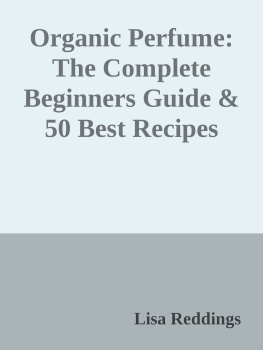
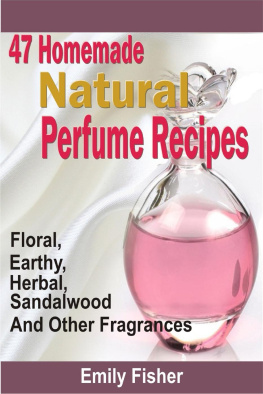
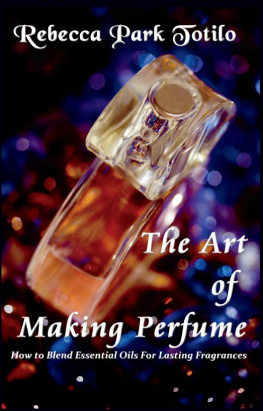
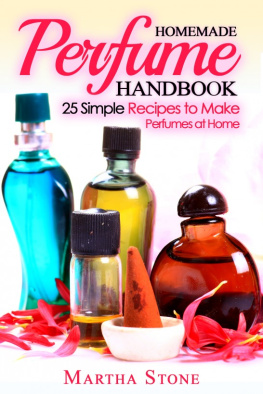
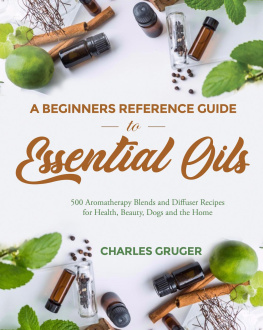

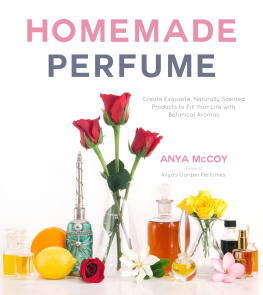
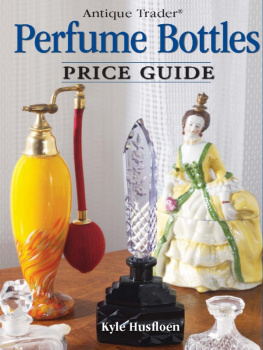
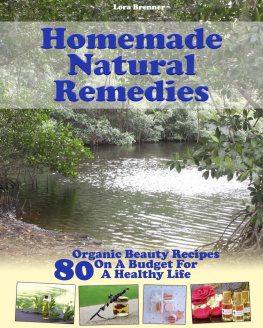
 Organic Perfume: The Complete Beginners Guide & 50 Best Recipes For Making Heavenly, Non-Toxic Organic DIY Perfumes From Your Home! Table of ContentsIntroduction Inside this book you will find information on how make your own organic and natural perfume, blend oils and create amazing scents to suit your individual personality. You will also discover the secrets about the hidden chemicals in commercial perfumes that the manufacturers dont want you to know, you will learn how to use products you can find in your local supermarket as a base for your creations and find recipes which will enable you to wonderful gifts for friends and family. The only thing standing in the way of you creating beautiful scents that have added therapeutic benefits is the limit of your own imagination. Thanks again for downloading this book, I hope you enjoy it! Chapter 1 What is Organic Perfume Organic perfumes are made up from natural products and contain none of the additional chemicals and synthetic scents that commercial perfumes are made from. They are manufactured using pure essential oils which not only offer an amazing variety of scents but which also contain therapeutic benefits, so in addition to smelling great, your perfumes could also be treating any ailments or long term health conditions you may have. In contrast, many commercial perfumes can cause health problems and/or exacerbate some conditions you may already be suffering from, such as allergic reactions, headaches, hormone disruption, increased severity of asthma or eczema conditions, thyroid complications and a suppressed immune system.
Organic Perfume: The Complete Beginners Guide & 50 Best Recipes For Making Heavenly, Non-Toxic Organic DIY Perfumes From Your Home! Table of ContentsIntroduction Inside this book you will find information on how make your own organic and natural perfume, blend oils and create amazing scents to suit your individual personality. You will also discover the secrets about the hidden chemicals in commercial perfumes that the manufacturers dont want you to know, you will learn how to use products you can find in your local supermarket as a base for your creations and find recipes which will enable you to wonderful gifts for friends and family. The only thing standing in the way of you creating beautiful scents that have added therapeutic benefits is the limit of your own imagination. Thanks again for downloading this book, I hope you enjoy it! Chapter 1 What is Organic Perfume Organic perfumes are made up from natural products and contain none of the additional chemicals and synthetic scents that commercial perfumes are made from. They are manufactured using pure essential oils which not only offer an amazing variety of scents but which also contain therapeutic benefits, so in addition to smelling great, your perfumes could also be treating any ailments or long term health conditions you may have. In contrast, many commercial perfumes can cause health problems and/or exacerbate some conditions you may already be suffering from, such as allergic reactions, headaches, hormone disruption, increased severity of asthma or eczema conditions, thyroid complications and a suppressed immune system.